| Listing 1 - 10 of 20 | << page >> |
Sort by
|
Book
ISBN: 1544330936 1452241856 148330566X 1544308728 9781544330938 9781452241852 9781483305660 9781544308722 Year: 2017 Publisher: Thousand Oaks, Calif. : SAGE Publications,
Abstract | Keywords | Export | Availability | Bookmark
 Loading...
Loading...Choose an application
- Reference Manager
- EndNote
- RefWorks (Direct export to RefWorks)
The first text of its kind, Ethics in Counseling and Therapy is not merely another text on ethical and legal issues in counseling. Where this book clearly differentiates itself is that it presents a framework for helping future counselors develop an ethical identity by laying a solid foundation of ethics from various complimentary fields (such as philosophy, sociology and political science). Competing texts on ethics are too focused on ethical Issues, which leaves the student with a set of professional guidelines to follow, but no real foundation for handling situations that may surface during any routine client session. In other words, where this book differs, is that it develops the counselor as a person, so they can make ethical decisions based on a solid foundation ...
Counseling --- Ethical Theory. --- Ethics, Clinical. --- Moral and ethical aspects. --- ethics.
Multi
ISBN: 9780521719407 9780521895248 9781139167499 0521719402 0521895243 Year: 2009 Publisher: Cambridge: Cambridge university press,
Abstract | Keywords | Export | Availability | Bookmark
 Loading...
Loading...Choose an application
- Reference Manager
- EndNote
- RefWorks (Direct export to RefWorks)
General ethics --- Ethics, Evolutionary. --- Medical ethics. --- Naturalism. --- Bioethics. --- Ethical Theory. --- Ethics, Evolutionary --- Medical ethics --- Naturalism --- Materialism --- Mechanism (Philosophy) --- Philosophy --- Positivism --- Science --- Biomedical ethics --- Clinical ethics --- Ethics, Medical --- Health care ethics --- Medical care --- Medicine --- Bioethics --- Professional ethics --- Nursing ethics --- Social medicine --- Ethics, Naturalistic --- Evolutionary ethics --- Naturalistic ethics --- Ethics --- Ethical relativism --- Moral and ethical aspects
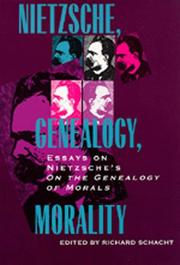
ISBN: 052091404X 0585079242 9780520914049 9780585079240 0520083172 0520083180 9780520083172 0520083172 9780520083189 0520083180 Year: 1994 Publisher: Berkeley University of California Press
Abstract | Keywords | Export | Availability | Bookmark
 Loading...
Loading...Choose an application
- Reference Manager
- EndNote
- RefWorks (Direct export to RefWorks)
Written at the height of the philosopher's intellectual powers, Friedrich Nietzsche's On the Genealogy of Morals has become one of the key texts of recent Western philosophy. Its essayistic style affords a unique opportunity to observe many of Nietzsche's persisting concerns coming together in an illuminating constellation. A profound influence on psychoanalysis, antihistoricism, and poststructuralism and an abiding challenge to ethical theory, Nietzsche's book addresses many of the major philosophical problems and possibilities of modernity. In this unique collection focusing on the Genealogy, twenty-five notable philosophers offer diverse discussions of the book's central themes and concepts. They explore such notions as ressentiment, asceticism, "slave" and "master" moralities, and what Nietzsche calls "genealogy" and its relation to other forms of inquiry in his work. The book presents a cross section of contemporary Nietzsche scholarship and philosophical investigation that is certain to interest philosophers, intellectual and cultural historians, and anyone concerned with one of the master thinkers of the modern age.
PHILOSOPHY / Political. --- Nietzsche, Friedrich Wilhelm, --- Philosophy, German. --- German philosophy --- anti semitism. --- antihistoricism. --- asceticism. --- cultural historians. --- essayistic style. --- essays. --- ethical theory. --- ethics. --- friedrich nietzsche. --- genealogy. --- german history. --- germany. --- master thinkers. --- master. --- mind vs void. --- modernity. --- moralities. --- morality. --- mortality. --- notable philosophers. --- philosophical investigation. --- philosophical problems. --- philosophy. --- political philosophy. --- political. --- poststructuralism. --- psychoanalysis. --- ressentiment. --- slave. --- western philosophy.
Book
ISBN: 9780195335705 0195335708 Year: 2009 Publisher: New York: Oxford university press,
Abstract | Keywords | Export | Availability | Bookmark
 Loading...
Loading...Choose an application
- Reference Manager
- EndNote
- RefWorks (Direct export to RefWorks)
WB 60 Bioethics. Clinical ethics. Clinical ethics committees --- Health Care --- Ethics --- Ethics, Medical --- Ethical Theory --- Ethics, Medical. --- bio-ethiek (medische, biomedische ethiek, bio-ethische aspecten) --- principebenadering (principalisme, autonomie, weldadigheid, weldoen, non maleficence, rechtvaardigheid) --- Medical Ethics --- Medicine --- Professionalism --- Bioethics --- bioéthique (éthique médicale, biomédicale, aspects bioéthiques) --- principlisme (principisme, principe éthique, autonomie, bienfaisance, non-malfaisance, non-nuisance, justice) --- ethics --- Medical ethics. --- Medical ethics --- Biomedical ethics --- Clinical ethics --- Health care ethics --- Medical care --- Professional ethics --- Nursing ethics --- Social medicine --- Moral and ethical aspects
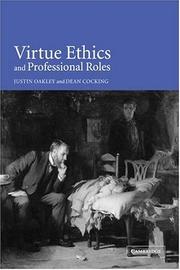
ISBN: 0521027292 0511015976 0511047231 052179305X 0511156499 1280433000 0511487118 0511175825 0511325444 1107122120 9780511015977 9780511047237 9780511487118 9781280433009 9780521793056 9780511156496 9780521027298 Year: 2001 Publisher: Cambridge Cambridge University Press
Abstract | Keywords | Export | Availability | Bookmark
 Loading...
Loading...Choose an application
- Reference Manager
- EndNote
- RefWorks (Direct export to RefWorks)
Professionals, it is said, have no use for simple lists of virtues and vices. The complexities and constraints of professional roles create peculiar moral demands on the people who occupy them, and traits that are vices in ordinary life are praised as virtues in the context of professional roles. Should this disturb us, or is it naive to presume that things should be otherwise? Taking medical and legal practice as key examples, Justin Oakley and Dean Cocking develop a rigorous articulation and defence of virtue ethics, contrasting it with other types of character-based ethical theories and showing that it offers a promising new approach to the ethics of professional roles. They provide insights into the central notions of professional detachment, professional integrity, and moral character in professional life, and demonstrate how a virtue-based approach can help us better understand what ethical professional-client relationships would be like.
Professional ethics. --- Professional ethics --- Lawyers --- Professional-Patient Relations --- Physicians --- Virtues --- Morals --- Ethical Theory --- Ethics, Professional --- Professional Role --- Health Personnel --- Ethics --- Occupational Groups --- Psychology, Social --- Delivery of Health Care --- Interpersonal Relations --- Role --- Humanities --- Philosophy --- Behavior and Behavior Mechanisms --- Health Care Quality, Access, and Evaluation --- Health Care Facilities, Manpower, and Services --- Group Processes --- Persons --- Psychiatry and Psychology --- Health Care --- Named Groups --- Philosophy & Religion --- Arts and Humanities --- Codes of ethics --- Codes of professional ethics --- Ethical codes --- Professional responsibility --- Professions --- Moral and ethical aspects --- #GBIB:CBMER --- Professional ethics. Deontology --- General ethics
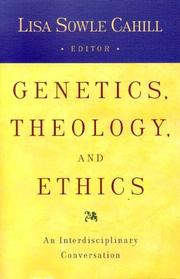
ISBN: 0824522699 9780824522698 Year: 2005 Publisher: New York: Crossroad,
Abstract | Keywords | Export | Availability | Bookmark
 Loading...
Loading...Choose an application
- Reference Manager
- EndNote
- RefWorks (Direct export to RefWorks)
Christian moral theology --- Professional ethics. Deontology --- Human genetics --- Bioethics. --- Moral and ethical aspects. --- Religious aspects. --- Human genetics - Moral and ethical aspects. --- Human genetics - Religious aspects. --- Bioethics --- Genetics --- Theology --- Religion --- Ethical Theory --- 241.63*5 --- Consequentialism --- Deontological Ethics --- Ethics, Deontological --- Ethics, Teleological --- Normative Ethics --- Teleological Ethics --- Utilitarianism --- Deontological Ethic --- Ethic, Deontological --- Ethic, Normative --- Ethic, Teleological --- Ethical Theories --- Ethics, Normative --- Normative Ethic --- Teleological Ethic --- Theories, Ethical --- Theory, Ethical --- Utilitarianisms --- Principle-Based Ethics --- Prayer --- Religious Beliefs --- Religious Ethics --- Beliefs, Religious --- Ethic, Religious --- Prayers --- Religions --- Religious Belief --- Spiritual Therapies --- Secularism --- Genetic Structures --- Genetic Phenomena --- Biology --- Biomedical ethics --- Life sciences --- Life sciences ethics --- Science --- Moral and ethical aspects --- Religious aspects --- Theologische ethiek: bio-ethiek (bioethiek); genetische experimenten; transplantatie; eugenetica --- Moral and religious aspects
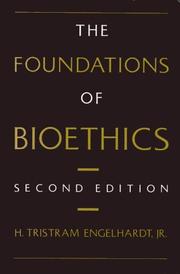
ISBN: 0195057368 Year: 1996 Publisher: New York : Oxford University Press,
Abstract | Keywords | Export | Availability | Bookmark
 Loading...
Loading...Choose an application
- Reference Manager
- EndNote
- RefWorks (Direct export to RefWorks)
Codes of Ethics --- Moral Obligations --- Informed Consent --- Infanticide --- Individuality --- Human Rights --- Human Experimentation --- Freedom --- Fetus --- Euthanasia, Passive --- Euthanasia --- Disease --- Morals --- Ownership --- Paternalism --- Analytical Approach --- Virtues --- Treatment Refusal --- Third-Party Consent --- Social Responsibility --- Social Justice --- Resource Allocation --- Professional-Patient Relations --- Postmodernism --- Personhood --- Personal Autonomy --- Death --- Confidentiality --- Rawls, John (1921-2002) --- Nozick, Robert (1938-2002) --- Kant, Immanuel (1724-1804) --- Public Policy --- Health --- Health Care Rationing --- Delivery of Health Care --- Ethics, Medical --- Bioethics --- Suicide --- Medicine --- Bioethical Issues --- Cultural Diversity --- Ethical Analysis --- Brain Death --- Beneficence --- Altruism --- Advance Directives --- Abortion, Induced --- Social Values --- Secularism --- Religion --- Philosophy --- Ethics --- Ethical Theory --- W 50 Medical ethics --- Medical ethics --- Ethique médicale --- Bioéthique --- Sciences médicales --- medical sciences --- Santé publique --- public health --- Bien-être social --- social welfare --- Patrimoine culturel --- Cultural heritage --- Législation --- legislation --- Droit --- law --- Biomedical ethics --- Clinical ethics --- Health care ethics --- Medical care --- Professional ethics --- Nursing ethics --- Social medicine --- Biology --- Life sciences --- Life sciences ethics --- Science --- Moral and ethical aspects --- Bioethics. --- Medical ethics. --- Ethique médicale --- Bioéthique --- legislation.
Book
ISBN: 904812476X 904812591X 9048124778 9400705212 9786612839238 1282839233 Year: 2009 Publisher: Dordrecht ; New York : Springer Verlag,
Abstract | Keywords | Export | Availability | Bookmark
 Loading...
Loading...Choose an application
- Reference Manager
- EndNote
- RefWorks (Direct export to RefWorks)
This project draws together the diverse strands of the debate regarding disability in a way never before combined in a single volume. After providing a representative sampling of competing philosophical approaches to the conceptualization of disability as such, the volume goes on to address such themes as the complex interplay between disability and quality of life, questions of social justice as it relates to disability, and the personal dimensions of the disability experience. By explicitly locating the discussion of various applied ethical questions within the broader theoretical context of how disability is best conceptualized, the volume seeks to bridge the gap between abstract philosophical musings about the nature of disease, illness and disability found in much of the philosophy of medicine literature, on the one hand, and the comparatively concrete but less philosophical discourse frequently encountered in much of the disability studies literature. It also critically examines various claims advanced by disability advocates, as well as those of their critics. In bringing together leading scholars in the fields of moral theory, bioethics, and disability studies, this volume makes a unique contribution to the scholarly literature, while also offering a valuable resource to instructors and students interested in a text that critically examines and assesses various approaches to some of the most vexing problems in contemporary social and political philosophy.
Disability awareness. --- Disability studies. --- People with disabilities. --- Sociology of disability. --- Philosophy, Medical --- Personal Autonomy --- Ethical Theory --- Social Justice --- Quality of Life --- Disabled Persons --- Human Rights --- Principle-Based Ethics --- Freedom --- Philosophy --- Persons --- Ethics --- Life --- Psychological Phenomena and Processes --- Social Sciences --- Anthropology, Education, Sociology and Social Phenomena --- Humanities --- Social Control, Formal --- Named Groups --- Psychiatry and Psychology --- Health Care Economics and Organizations --- Sociology --- Health Care --- Medical Ethics & Philosophy --- Disabilities --- Medicine --- Social Welfare & Social Work --- Health & Biological Sciences --- Social sciences. --- Philosophy and social sciences. --- Political philosophy. --- Medicine. --- Medical ethics. --- Sociology. --- Social Sciences. --- Sociology, general. --- Medicine/Public Health, general. --- Philosophy of the Social Sciences. --- Philosophy of Medicine. --- Theory of Medicine/Bioethics. --- Political Philosophy. --- Philosophy. --- Cripples --- Disabled --- Disabled people --- Disabled persons --- Handicapped --- Handicapped people --- Individuals with disabilities --- People with physical disabilities --- Persons with disabilities --- Physically challenged people --- Physically disabled people --- Physically handicapped --- Sociology of disability --- People with disabilities --- Education --- Study and teaching --- Curricula --- Social sciences --- Medicine-Philosophy. --- Political science --- Political philosophy --- Biomedical ethics --- Clinical ethics --- Ethics, Medical --- Health care ethics --- Medical care --- Bioethics --- Professional ethics --- Nursing ethics --- Social medicine --- Social philosophy --- Social theory --- Clinical sciences --- Medical profession --- Human biology --- Life sciences --- Medical sciences --- Pathology --- Physicians --- Moral and ethical aspects --- Health Workforce --- Medicine—Philosophy. --- Social sciences and philosophy
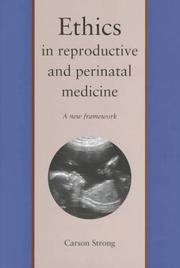
ISBN: 0300068328 9780300068320 Year: 1997 Publisher: New Haven: Yale university press,
Abstract | Keywords | Export | Availability | Bookmark
 Loading...
Loading...Choose an application
- Reference Manager
- EndNote
- RefWorks (Direct export to RefWorks)
Advances in reproductive and perinatal medicine have given rise to difficult ethical issues. Do all women have the right to choose whether to reproduce? What is the moral status of the foetus during various stages of gestation and what obligations do parents have to the foetus during this period? In this book Carson Strong develops an ethical framework that aims to help resolve these and many other issues of concern to health professionals, policymakers and the general public. Strong begins by exploring the significance of reproductive freedom, drawing on constitutional law and feminist writings, among other sources. Next he assesses the moral status of offspring during pre-embryonic, embryonic, foetal and postnatal stages of development, discussing the obligations of procreators during gestation, and offering a perspective on the idea that the moral standing of the foetus increases as foetal development proceeds. He then suggests an approach to the question of how priorities should be assigned to conflicting values, one that draws on a version of casuistic reasoning.In the second half of the book, Strong applies this ethical framework to some of the problematic areas in reproductive and perinatal medicine. These include prenatal genetic testing for susceptibilities to common diseases and for "enhancement" of offspring; research using pre-embryos and embryos; non-traditional family arrangements, such as surrogate motherhood and ovum donation for older women; and treatment of foetuses with anomalies. His discussion takes into account the clinical dimensions of issues and reflects a consideration of the ethical, legal, medical and psychosocial literature. Drawing on the law and feminist writings, this text explores the significance of reproductive freedom. It assesses the moral status of offspring in pre-embryonic, embryonic, foetal and postnatal development and applies an ethical framework to problematic areas in reproductive medicine.
Biologie humaine -- Morale et aspects éthiques --- Biomedical ethics --- Biomedische ethiek --- Biomédecine -- Morale et aspects éthiques --- Deontologie [Medische ] --- Deontology [Medical ] --- Déontologie médicale --- Ethics [Medical ] --- Ethiek [Medische ] --- Ethique médicale --- Medical care -- Moral and ethical aspects --- Medical deontology --- Medical ethics --- Medicine -- Moral and ethical aspects --- Medische deontologie --- Medische ethiek --- Morale et médecine --- Morale médicale --- Médecine -- Innovations -- Morale et aspects éthiques --- Médecine -- Morale et aspects éthiques --- Médecine et morale --- Politique sanitaire -- Morale et aspects éthiques --- Reproductie (Biologie) --- Reproduction (Biologie) --- Reproduction (Biology) --- Soins médicaux -- Morale et aspects éthiques --- Éthique clinique --- Human reproductive technology --- Perinatology --- Public Policy --- Risk --- Research --- Moral Obligations --- Pregnant Women --- Privacy --- Age Factors --- Cryopreservation --- Embryo Disposition --- Genetic Enhancement --- Ethics --- Feminism --- Genetic Diseases, Inborn --- Reproduction --- Reproductive Techniques, Assisted --- Spermatozoa --- Social Responsibility --- Treatment Refusal --- Ethics, Medical --- Genetic Testing --- Infant, Newborn, Diseases --- Civil Rights --- Fetal Viability --- Homosexuality --- Human Rights --- Ownership --- Substance-Related Disorders --- Contraception --- Embryo Research --- Embryonic Development --- Ethical Theory --- Risk Assessment --- Pregnancy --- Single Person --- Coercion --- Embryo, Mammalian --- Fetal Development --- Infant --- Congenital Abnormalities --- Abortion, Eugenic --- Surrogate Mothers --- Genetic Engineering --- Jurisprudence --- Abortion, Induced --- Fetus --- Self Concept --- Tissue Donors --- Women --- Social Values --- Women's Rights --- Oocyte Donation --- Preimplantation Diagnosis --- Cesarean Section --- Social Control, Formal --- Ethics, Clinical --- Embryonic and Fetal Development --- Epidemiologic Factors --- Embryonic Structures --- Probability --- Social Control Policies --- Obstetric Surgical Procedures --- Preservation, Biological --- Delivery, Obstetric --- Reproductive Physiological Processes --- Germ Cells --- Parents --- Marital Status --- Health Care Quality, Access, and Evaluation --- Epidemiologic Measurements --- Social Control, Informal --- Genetic Techniques --- Morals --- Reproductive Techniques --- Persons --- Biomedical Research --- Physiological Phenomena --- Patient Rights --- Mental Disorders --- Diagnostic Techniques, Obstetrical and Gynecological --- Legislation as Topic --- Personality Development --- Investigative Techniques --- Congenital, Hereditary, and Neonatal Diseases and Abnormalities --- Science --- Tissue Preservation --- Risk Management --- Organization and Administration --- Humanism --- Reproductive Physiological Phenomena --- Health Behavior --- Pediatrics --- Age Groups --- Humanities --- Diagnostic Techniques and Procedures --- Genetic Services --- Diseases --- Patient Acceptance of Health Care --- Biomedical Enhancement --- Psychology, Social --- Diagnostic Services --- Philosophy --- Sexuality --- Named Groups --- Cells --- Sexual Behavior --- Health Care Economics and Organizations --- Quality of Health Care --- Anatomy --- Behavior and Behavior Mechanisms --- Personality --- Sociology --- Analytical, Diagnostic and Therapeutic Techniques and Equipment --- Natural Science Disciplines --- Medicine --- Specimen Handling --- Attitude to Health --- Diagnosis --- Public Health --- Statistics as Topic --- Policy --- Mathematical Concepts --- Health Care --- Histocytological Preparation Techniques --- Health Services Administration --- Preventive Health Services --- Biomedical Technology --- Surgical Procedures, Operative --- Behavior --- Ethics, Professional --- Psychiatry and Psychology --- Phenomena and Processes --- Morphogenesis --- Family Characteristics --- Reproductive and Urinary Physiological Phenomena --- Health Services --- Therapeutics --- Genitalia --- Nuclear Family --- Cytological Techniques --- Social Sciences --- Growth and Development --- Environment and Public Health --- Histological Techniques --- Demography --- Family --- Community Health Services --- Health Care Evaluation Mechanisms --- Urogenital System --- Technology --- Health Occupations --- Socioeconomic Factors --- Epidemiologic Methods --- Health Care Facilities, Manpower, and Services --- Laboratory Techniques and Procedures --- Delivery of Health Care --- Disciplines and Occupations --- Clinical Laboratory Techniques --- Population Characteristics --- Anthropology, Education, Sociology and Social Phenomena --- Technology, Industry, and Agriculture --- Physiological Processes --- Technology, Industry, Agriculture --- Gynecology & Obstetrics --- Health & Biological Sciences --- Moral and ethical aspects --- Ethics, Medical. --- Reproduction. --- Moral and ethical aspects. --- reproductief recht (recht om zich voort te planten, recht op een kind) --- reprodu --- Medicine, Perinatal --- Perinatal medicine --- Obstetrics --- Medical Ethics --- Professionalism --- Bioethics --- Human Reproductive Index --- Human Reproductive Indexes --- Reproductive Period --- Human Reproductive Indices --- Index, Human Reproductive --- Indexes, Human Reproductive --- Indices, Human Reproductive --- Period, Reproductive --- Periods, Reproductive --- Reproductive Index, Human --- Reproductive Indices, Human --- Reproductive Periods --- droit reproductif (droit de procréer, droit à la procréation, droits de la reproduction, droit à l'enfant) --- ethics --- Perinatology - Moral and ethical aspects. --- Human reproductive technology - Moral and ethical aspects --- Perinatology - Moral and ethical aspects
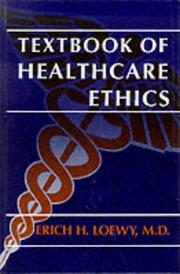
ISBN: 9780306452406 0306452405 0585416834 9786610042371 1280042370 0306468018 9401737959 Year: 1996 Publisher: New York: Plenum Press,
Abstract | Keywords | Export | Availability | Bookmark
 Loading...
Loading...Choose an application
- Reference Manager
- EndNote
- RefWorks (Direct export to RefWorks)
Here, Erich H. Loewy expands on his earlier book Textbook of Medical Ethics (1989) offering healthcare workers and students a new perspective on ethical practice. Textbook of Healthcare Ethics focuses on the social conditions in which medical practice occurs and how ethical healthcare decisions involves nurses, social workers, psychologists, technicians, and patients as well as physicians. This thoroughly revised and expanded edition addresses historical and theoretical underpinnings and practical concerns. A series of case studies serve as a guideline for further discussion. The text examines provocative issues such as organ donation, care of the terminally ill, abortion, HIV-positive healthcare professionals, physician-assisted suicide, and experimentation with fetal tissue. This is an ideal book for all members of the healthcare team as well as students and residents in any discipline of medicine.
Medical ethics. --- Bioethics. --- Ethique médicale --- Bioéthique --- Epidemiology. --- Ethics. --- Family medicine. --- Internal medicine. --- Medicine. --- Medical ethics --- Ethical Theory --- Informed Consent --- Personal Autonomy --- Third-Party Consent --- Cultural Diversity --- Ethical Analysis --- Ethics Committees --- Freedom --- Health Personnel --- Human Rights --- Resuscitation Orders --- Suicide, Assisted --- Abortion, Induced --- Acquired Immunodeficiency Syndrome --- Advance Directives --- Euthanasia, Active --- Euthanasia, Passive --- Fetus --- HIV Seropositivity --- Mental Competency --- Congenital Abnormalities --- Ethics, Medical --- Euthanasia --- Fetal Research --- Social Responsibility --- Economics --- Ethics Committees, Clinical --- Health Care Rationing --- Moral Obligations --- Pregnant Women --- Bioethical Issues --- Ethics --- History --- Pregnancy --- Social Justice --- Genetic Engineering --- Medicine --- Professional-Patient Relations --- Research --- Tissue and Organ Procurement --- Infant, Newborn, Diseases --- Paternalism --- Terminal Care --- Bioethics --- Decision Making --- Delivery of Health Care --- Ethics, Professional --- Infant, Newborn --- Resource Allocation --- Tissue Donors --- Social Values --- Deception --- Medical Futility --- Organ Transplantation --- Truth Disclosure --- Jurisprudence --- Culture --- Disclosure --- Patient Care Management --- Occupational Groups --- Social Behavior --- Ethics, Clinical --- Principle-Based Ethics --- Genetic Techniques --- Prognosis --- Biomedical Research --- Social Sciences --- Psychological Phenomena and Processes --- Advance Care Planning --- Psychology, Social --- Embryonic Structures --- Resuscitation --- Health Services --- Health Care Facilities, Manpower, and Services --- Thinking --- Patient Rights --- HIV Infections --- Health Care Quality, Access, and Evaluation --- Humanities --- Reproduction --- Health Services Accessibility --- Homicide --- Morals --- Patient Care --- Congenital, Hereditary, and Neonatal Diseases and Abnormalities --- Slow Virus Diseases --- Persons --- Science --- Professional Staff Committees --- Health Care Economics and Organizations --- Social Control, Formal --- Interpersonal Relations --- Women --- Withholding Treatment --- Infant --- Health Planning --- Suicide --- Philosophy --- Obstetric Surgical Procedures --- Health Occupations --- Behavior and Behavior Mechanisms --- Investigative Techniques --- Transplantation --- Diagnosis --- Sociology --- Immunologic Deficiency Syndromes --- Anthropology, Education, Sociology and Social Phenomena --- Communication --- Disciplines and Occupations --- Virus Diseases --- Behavior --- Health Care --- Mental Processes --- Age Groups --- Surgical Procedures, Operative --- Self-Injurious Behavior --- Emergency Treatment --- Patient Care Planning --- Lentivirus Infections --- Psychiatry and Psychology --- Health Services Administration --- Diseases --- Named Groups --- Sexually Transmitted Diseases, Viral --- Quality Assurance, Health Care --- Anatomy --- Professional Practice --- Natural Science Disciplines --- Analytical, Diagnostic and Therapeutic Techniques and Equipment --- Therapeutics --- Social Problems --- Reproductive Physiological Processes --- Anthropology, Cultural --- Immune System Diseases --- Comprehensive Health Care --- Organization and Administration --- Anthropology --- Retroviridae Infections --- Sexually Transmitted Diseases --- Reproductive Physiological Phenomena --- Behavioral Symptoms --- Reproductive and Urinary Physiological Phenomena --- RNA Virus Infections --- Phenomena and Processes --- Medical Ethics & Philosophy --- Health & Biological Sciences --- geneeskunde (medische aspecten) --- medische praktijk --- geschiedenis (historische aspecten) --- zorgverstrekker-patiëntrelatie (verpleegkundige-patiëntrelatie) --- aids (HIV) --- orgaandonatie --- levenseinde (einde van het leven, levenseindebeslissing) --- begin van het leven --- gezondheidszorgbeleid (gezondheidszorghervorming, gezondheidszorgsysteem) --- médecine (aspects médicaux) --- pratique médicale --- histoire (aspects historiques) --- relation soignant-patient (relation infirmier-patient) --- sida (VIH) --- don d'organes --- fin de vie (décision de fin de vie) --- début de vie --- politique des soins de santé (réforme des soins de santé, système des soins de santé) --- General practice (Medicine). --- Public health. --- Medicine & Public Health. --- Internal Medicine. --- General Practice / Family Medicine. --- Public Health. --- Medicine/Public Health, general. --- Professional ethics. Deontology --- Human medicine --- Ethics, Medical. --- autonomie van de patiënt --- bio-ethiek (medische, biomedische ethiek, bio-ethische aspecten) --- ethiek (ethische aspecten) --- #GBIB:CBMER --- Biomedical ethics --- Clinical ethics --- Health care ethics --- Medical care --- autonomie du patient --- bioéthique (éthique médicale, biomédicale, aspects bioéthiques) --- ethique (aspects ethiques) --- Moral and ethical aspects --- Professional ethics --- Nursing ethics --- Social medicine --- Deontology --- Ethics, Primitive --- Ethology --- Moral philosophy --- Morality --- Philosophy, Moral --- Science, Moral --- Values --- Health Workforce --- Public health --- Community health --- Health services --- Hygiene, Public --- Hygiene, Social --- Public health services --- Public hygiene --- Social hygiene --- Health --- Human services --- Biosecurity --- Health literacy --- Medicine, Preventive --- National health services --- Sanitation --- Medicine, Internal
| Listing 1 - 10 of 20 | << page >> |
Sort by
|

 Search
Search Feedback
Feedback About UniCat
About UniCat  Help
Help News
News